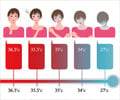At the University of Adelaide, new research shows that the state of South Australia has a higher rate of deaths from extreme cold compared with the northern European nation of Sweden.

The results show that South Australia had a rate of 3.9 deaths for every 100,000 people, compared with Sweden's 3.3 deaths per 100,000. In total, there were 62 fatal cases of hypothermia in South Australia and 296 cases in Sweden over the six-year period.
"Despite considerable demographic, geographic and climate differences, the death rate from hypothermia was slightly higher in South Australia than in Sweden, which is a very surprising result," says the leader of the project, the University's Professor Roger Byard AO.
Hypothermia is defined as a decrease in core body temperature below 35°C, with fatal hypothermia occurring at body temperatures of 26°C to 29°C.
"Most of the deaths from hypothermia in South Australia involved elderly women indoors who were living alone, often with multiple underlying illnesses and limited contact with the outside world. Many of them had been dead for at least a day before they were discovered," Professor Byard says.
"This is in contrast with the majority of hypothermia deaths in Sweden, which usually occur outdoors and involve middle-aged males, commonly under the influence of alcohol. These bodies are often uncovered from snow drifts.
Advertisement
Medical Sciences PhD student Fiona Bright says descriptions of the houses were not available in the South Australian cases, so the reasons for the higher rates of indoor deaths in SA can only be speculated on.
Source-Eurekalert












